Thailand-Cambodia ceasefire begins after weeks of deadly clashes
A ceasefire between Thailand and Cambodia has come into effect along the border, where almost three weeks of deadly clashes have forced nearly one million people from their homes.
In a joint statement, the defence ministers of the two countries agreed to freeze the front lines where they are now, ban reinforcements and allow civilians living in border areas to return as soon as possible.
The ceasefire took effect at noon local time (05:00 GMT) on Saturday. Once it has been in place for 72 hours, 18 Cambodian soldiers held by Thailand since July will be released, the statement said.
The breakthrough came after days of talks between the two countries, with diplomatic encouragement from China and the US.
The agreement prioritises getting the displaced back to their homes, and also includes an agreement to remove landmines.
Thailand’s Defence Minister Natthaphon Narkphanit described the ceasefire as a test for the “other party’s sincerity”.
“Should the ceasefire fail to materialise or be violated, Thailand retains its legitimate right to self-defence under international law,” he told reporters.
UN human rights chief Volker Türk said he hopes the ceasefire will “pave the way” for peace, while an EU spokesperson urged “good faith” in its implementation.
Thailand had been reluctant to accept the ceasefire, saying the last one was not properly implemented. They also resented what they saw as Cambodia’s efforts to internationalise the conflict.
Unlike the last ceasefire in July, US President Donald Trump was conspicuously absent from this one, although the US State Department was involved.
That ceasefire agreement collapsed earlier this month, when fresh clashes erupted. Both sides blamed each other for the breakdown of the truce.
The Thai army said its troops had responded to Cambodian fire in Thailand’s Si Sa Ket province, in which two Thai soldiers were injured.
Cambodia’s defence ministry said it was Thai forces that had attacked first, in Preah Vihear province, and insisted that Cambodia did not retaliate.
Clashes have continued throughout December. On Friday, Thailand carried out more air strikes inside Cambodia.
The Thai Air Force said it had hit a Cambodian “fortified military position” after civilians had left the area. Cambodia’s defence ministry said the strikes were “indiscriminate attacks” against civilian houses.
How well the ceasefire holds this time depends to a large extent on political will. Nationalist sentiment has been inflamed in both countries.
Cambodia, in particular, has lost many soldiers and a lot of its military equipment. It has been driven back from positions it held on the border, and suffered extensive damage from the Thai air strikes, grievances which could make a lasting peace harder to achieve.
Disagreement over the border dates back more than a century, but tension increased early this year after a group of Cambodian women sang patriotic songs in a disputed temple.
A Cambodian soldier was killed in a clash in May, and two months later, in July, there were five days of intense fighting along the border, which left dozens of soldiers and civilians dead. Thousands more civilians were displaced.
Following intervention by Malaysia and President Trump, a fragile ceasefire was negotiated between the two countries, and signed in late October.
Trump dubbed the agreement the “Kuala Lumpur Peace Accords”. It mandated both sides to withdraw their heavy weapons from the disputed region, and to establish an interim observer team to monitor it.
However, the agreement was suspended by Thailand in November after Thai soldiers were injured by landmines, with Thai Prime Minister Anutin Charnvirakul announcing that the security threat had “not actually decreased”.

